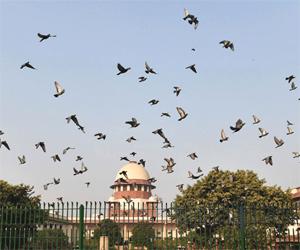High-profile politicians like Arun Jaitley, Arvind Kejriwal, Shashi Tharoor and Subramanian Swamy were the newsmakers of 2017 in the Delhi High Court


ADVERTISEMENT
High-profile politicians like Arun Jaitley, Arvind Kejriwal, Shashi Tharoor and Subramanian Swamy were the newsmakers of 2017 in the Delhi High Court, which tightened its noose around a fake spiritual guru whose activities were akin to incarcerated Gurmeet Ram Rahim Singh. The incident similar to Haryana's Dera Sacha Sauda, where girls and women were sexually exploited, surfaced from an ashram in north-west Delhi run by Virender Dev Dixit under the garb of spiritual university after which the high court swung into action this month to order a CBI probe.
The agency, which has been tasked with tracing Dixit, has been directed to reach to the bottom of the crime. However, before this late development of the year, the Jaitley-Kejriwal defamation cases hogged the limelight with both leaders trading charges against each other. The matter reached the crescendo when noted lawyer Ram Jethmalani appearing for the AAP supremo hurled abusive words at the BJP leader who filed a second libel suit against the Delhi chief minister.
Realising the damage caused to him, Kejriwal not only disowned the statement made on his behalf by Jethmalani, but also distanced himself from the jurist, who stuck to his guns that it was the chief minister who instructed him. Congress' Tharoor also had a tiff with a newly-launched TV channel and its senior journalist on how the mysterious death of his wife Sunanda Pushkar in 2014 was being aired or broadcast.
While the high court refused to restrain the channel and its scribe from airing news or debates relating to Pushkar's death, it, however, said the reporting has to be "tempered and balanced" and Tharoor's "right to silence" be respected. Her death was also the subject matter of BJP leader Swamy's plea for a SIT probe into the incident, but his PIL was junked by the high court which termed it as a "textbook example of a political interest litigation". Amid these development, the high court is considering laying down guidelines to regulate the media coverage.
The high court on its administrative side was also active on the issue of alleged corruption in the lower judiciary as several judges were axed or suspended. Besides all these sensitive matters, the Sharad Yadav-led faction of Janata Dal (United) and T T V Dhinakaran-V K Sasikala faction of AIADMK rushed to the high court to retain the original party symbol without success. Yadav along with his party colleague Anwar Ali also unsuccessfully challenged their disqualification from the Rajya Sabha after they parted ways with the parent party led by Bihar Chief Minister Nitish Kumar.
Politicians facing corruption charges got no relief from the court which refused to quash the CBI's disproportionate assets case against former Himachal Pradesh Chief Minister Virbhadra Singh and his wife, saying there is no basis to claim that the FIR is the result of any "political vendetta". Singh, whose party lost the state legislative assembly polls at the fag end of the year, his wife and son are also facing a money laundering probe as their pleas to quash a PMLA case against them was rejected by the high court.
Controversial businessman and meat exporter Moin Qureshi also failed to get any relief from the high court which dismissed his plea against his arrest by the Enforcement Directorate (ED) in a money laundering case. The year also saw the high court ordering re-trial in five 1984 anti-Sikh riots cases in which all the accused were acquitted in 1986, saying that they had faced allegations of "horrifying crimes against humanity". However, "Peepli Live" co-director Mahmood Farooqui had
reason to rejoice after the high court acquitted him in a rape case involving a US researcher on the ground that it was doubtful whether any such incident took place. It was not just the high and mighty and their grievances which cornered the attention of the high court as it is actively monitoring the probe into the over a year long mysterious disappearance of JNU student Najeeb Ahmed.
The high court handed over the investigation of the case to the CBI in May this year after the police failed to get any results after nearly seven months of probe. The high court has asked the missing student's family to be patient as the CBI is still investigating the case. Besides the political and criminal cases which were predominant in the high court, it also rapped the Delhi government and other civic bodies, saying if they would have done their job properly, no illegal construction would have come in the national capital.
In all these matters, the civic authorities, especially the municipal corporations, faced the wrath of the high court for not discharging their statutory duties. Anguished over their non-functioning, the high court has appointed a committee to look into the illegal construction and sought for their reports, which said Delhi will have to pay a huge price for "unhealthy and unhygienic" living as 90 per cent of the buildings here are illegal. The court is actively monitoring the lack of cleanliness in the city and the resultant increase in cases of vector- borne diseases, like dengue, as well as air pollution.
Catch up on all the latest Mumbai, National and International news here
Download the new mid-day Android and iOS apps to get updates on all the latest and trending stories on the go
 Subscribe today by clicking the link and stay updated with the latest news!" Click here!
Subscribe today by clicking the link and stay updated with the latest news!" Click here!






